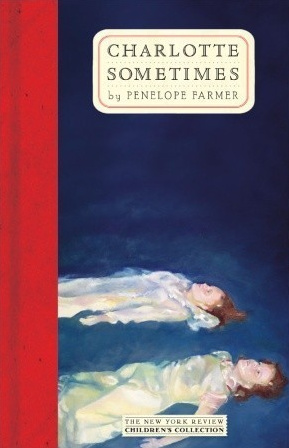

“Of course I'm not going to look through the keyhole. That's something only servants do. I'm going to hide in the bay window.”
― Penelope Farmer, quote from Charlotte Sometimes
“Where you some particular person because people recognized you as that?”
― Penelope Farmer, quote from Charlotte Sometimes
“And, she thought uncomfortably, what would happen if people did not recognize you? Would you know who you were yourself? If tomorrow they started to call her Vanessa or Janet or Elizabeth, would she know how to be, how to feel like, Charlotte? Were you some particular person only because people recognized you as that?”
― Penelope Farmer, quote from Charlotte Sometimes
“Charlotte was used to all the marks of war: the shabbiness of things, bad food, shop queues, posters about the war effort, people with worried faces, people dressed in black. She was used to seeing the wounded men from the hospital with their bright blue uniforms and bright red ties, the colours, she thought, if not the clothes of Arthur's soldiers. Such things did not disturb her, and the war seemed quite remote. But this disturbed her, the grotesque kind of circus that came now. It did not seem remote at all, nor did it fit with her vague ideas of war gained from those books of Arthur's she had read, with their flags and glory and brave drummer boys. How could you dare to become a soldier, knowing that you might end like this? There were men like clowns with white heads, white arms, white legs, men with crutches, slings, and bloodied bandages, and all so distressingly like men you would expect to see walking down the street, two armed, two legged, in hats instead of bandages and suits of black not battered khaki. Some came on stretchers borne by whole and ordinary men, some hobbled and leaned on whole ordinary arms. Most had mud dried thick across their clothes, and all came from the dark station's mouth with the spewings of trains behind, the clankings, thumpings, grindings, the sounds like great devils taking in breaths and blowing them out again.”
― Penelope Farmer, quote from Charlotte Sometimes
“Charlotte looked up doubtfully, wondering why, as she got older, she seemed to be more afraid of things, not less.”
― Penelope Farmer, quote from Charlotte Sometimes

“Even her footsteps did not seem to belong to her. The night seized and transformed them, just as it transformed the greenhouses they passed from useful places for growing things into cold night palaces.”
― Penelope Farmer, quote from Charlotte Sometimes
“But when she put her fingers into the water and pulled a marble out, it was small by comparison with those still in the glass, and unimportant, too. It was like the difference between what you long for and what you find--the difference, for instance, between Arthur's image of war and his experience of it. It was like other times, her own and Miss Agnes' proper childhood times that seemed so near to her memory and yet so far away. It was like everything that made you ache because in on sense it was so close and in another unobtainable.”
― Penelope Farmer, quote from Charlotte Sometimes
“It was at this time that some very pious Englishmen, known as the Early Fathers, who were being persecuted for not learning Avoirduroi, sailed away to America in a ship called the Mayfly; this is generally referred to as the Pilgrims' Progress and was one of rhe chief causes of America.”
― quote from 1066 and All That: A Memorable History of England
“All true? I think autobiographers are big liars.”
― John Rechy, quote from After the Blue Hour
“PROSCIUTTO- AND SAGE-WRAPPED DATES (Serves 6) INGREDIENTS 24 fresh sage leaves 12 dates, halved, pits removed 1 pack prosciutto, each slice sliced lengthways down the middle 2 Tablespoons maple syrup Preheat oven to 350 degrees. Place a sage leaf on each date half, wrap with prosciutto, place flat side down on a baking sheet. Bake 10 minutes. Brush with maple syrup and serve.”
― Jane Green, quote from Saving Grace
“My obsession. My muse. My enemy. “All”
― L.J. Shen, quote from Vicious
“Being left behind was a special kind of loss. —”
― J.R. Ward, quote from Blood Vow
BookQuoters is a community of passionate readers who enjoy sharing the most meaningful, memorable and interesting quotes from great books. As the world communicates more and more via texts, memes and sound bytes, short but profound quotes from books have become more relevant and important. For some of us a quote becomes a mantra, a goal or a philosophy by which we live. For all of us, quotes are a great way to remember a book and to carry with us the author’s best ideas.
We thoughtfully gather quotes from our favorite books, both classic and current, and choose the ones that are most thought-provoking. Each quote represents a book that is interesting, well written and has potential to enhance the reader’s life. We also accept submissions from our visitors and will select the quotes we feel are most appealing to the BookQuoters community.
Founded in 2023, BookQuoters has quickly become a large and vibrant community of people who share an affinity for books. Books are seen by some as a throwback to a previous world; conversely, gleaning the main ideas of a book via a quote or a quick summary is typical of the Information Age but is a habit disdained by some diehard readers. We feel that we have the best of both worlds at BookQuoters; we read books cover-to-cover but offer you some of the highlights. We hope you’ll join us.